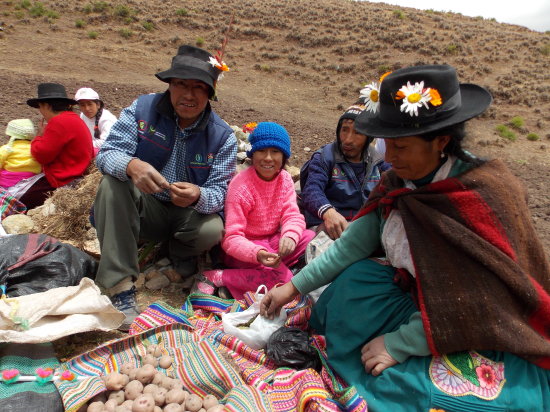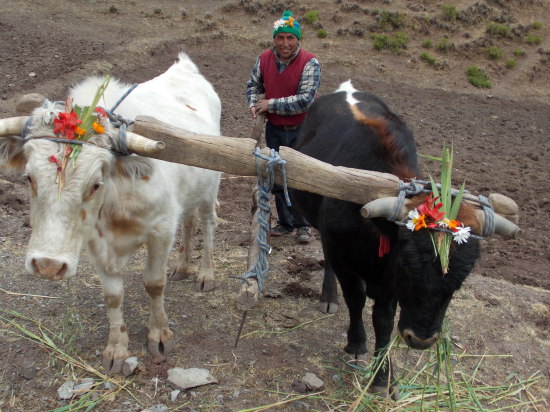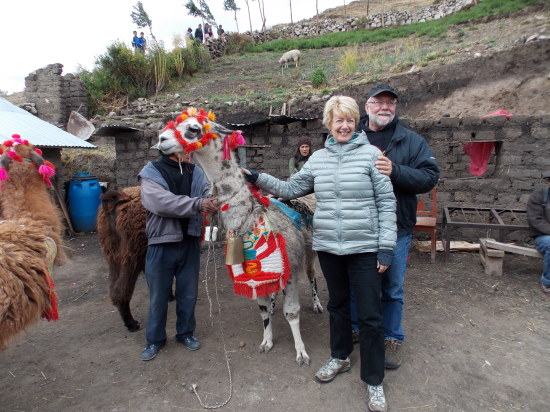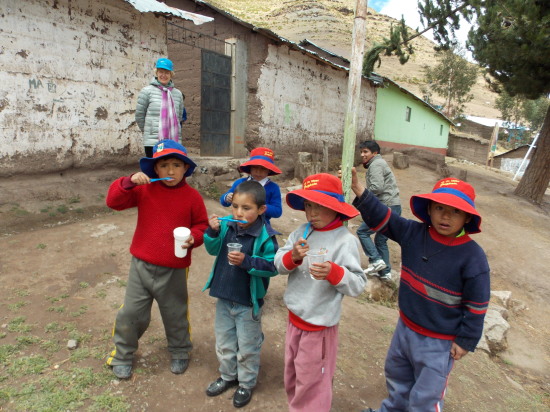Dr. Louise P. Evenson is a member of the Lutheran World Relief board of directors. Recently, she traveled to Peru with LWR president Daniel Speckhard and Senior Director for Latin America Programs, Carolyn Barker-Villena.
The title of this blog post is something of a misnomer. I learned far more than three things on my trip! But I will say that these three things will stay with me a long time and make me even more thankful for the work Lutheran World Relief is doing around the world.
So come with me…and visit with potato farmers in Peru and learn how your support is truly changing lives!
Lesson #1: When LWR says they work in remote rural communities, they are not kidding!
After arriving in Lima and meeting Pedro Veliz and Eduardo Contreras, LWR’s Andean Regional Representative and Country Director for Peru, respectively, we traveled four hours by car along the coast of Peru. Along the way we passed many corporate farms that grew things like corn and avocados. Then, after making a left turn we began to ascend.
Our journey took us up a single-lane, curvy mountain road with no guard rail, but the landscape was breathtaking. Four hours after that we arrived in the town of Castrovirreyna.

This area was once the site of much conflict, forcing some families to leave their land behind and seek safety. Now many of them are coming back. Lutheran World Relief is working with potato farmers in this region to help re-establish native potato varieties to eat and sell for income. In fact, you’ve probably already met at least two people benefitting from this project – Juan and Daisy.
Lesson #2: LWR truly does works with small-holder farmers.
The second thing that was affirmed for me on this trip is that when LWR says they work with small-holder farmers, they mean it. Most families plant on land that is less than one hectare (about 2.5 acres). Yet, as I witnessed, LWR is helping them to make a living from their land.
On the day of our visit, we traveled to the village of Cocha, to accompany Daisy and her family as they went about the business of potato farming. Part of the tradition of the region is to have a planting ceremony. So we listened as the family explained how they’d received training to be able to pick out the best potatoes to use for seedlings. And we watched as they decorated oxen with flowers – as is the local tradition – before they plowed a furrow in the ground to plant the seedlings.

As I watched I was inspired by the pride with which Daisy’s family speaks of their farm. I could tell that, to them, this was more than a piece of land, more than a home even. To them, it was a legacy they were passing onto their children. And it’s a legacy my husband, Paul, and I now share. During the ceremony we were named “godparents” of the family’s potato fields. We are praying for a bumper crop!
Lesson #3: The blessings we create through this work are both reciprocal and immeasurable
At the end of the day’s festivities, there was a festive meal, called a Pachamanca. To prepare for it, early that morning while we were still trekking to get there, members of the community dug a hole deep into the ground and filled it with timbers. In the hole they placed rocks which heat up over the fire. Once the rocks were warm enough, chicken, alpaca meat, whole lima bean pods, pots of cheese and potatoes were laid on top and then covered with grass and dirt to roast in this earthen oven. More on that in a moment.
After we attended the potato planting ceremony, we went to see how LWR has worked with the community to improve their irrigation. They’ve built small reservoirs to capture the rain and spring water, which is then fed into large scale sprinkler systems that cover over 60 hectares. Clearly, this intervention is working. Immediately around me I saw green, verdant fields amongst a backdrop of bleak ones.

By the time we were done visiting the irrigation site, the food had roasted to perfection and it was time to celebrate. The entire community came out to Daisy’s family home. As I ate and joined in fellowship with the community, I saw so many blessings playing out before my eyes.
I heard farmers talking with pride about their land and crops. The land here is rough. As we traveled I saw farmers breaking up rocky dirt with axes. But many farmers here were talking about organic farming and how they wanted to grow their potatoes organically.
I saw children who were attending school. During the day we were greeted by a group of students who sang us a song. Two children in particular struck me – two girls – who were playing the drums, leading the entire school in song. This school had also received toothbrushes and toothpaste from LWR as part of the Quilt and Kit ministry. The children showed us with pride how they brush their teeth every day at school.

And I also saw a connection. I grew up on a farm and I’ve seen first-hand that all farmers are dependent on sun and rain for their livelihood. To see that our support of Lutheran World Relief helps people in small, rural communities like Cocha live better lives is not only a blessing to them, but a blessing to me and to all of us.
I’d like to thank the staff of LWR – especially Pedro, Eduardo and staff at CEDINCO, our partner organization – along with Daisy and all the people we met for their hospitality. I also want to thank you for your prayers and support of Lutheran World Relief. Through this trip I saw first-hand that our investment in these communities does so much more than I ever imagined possible.

